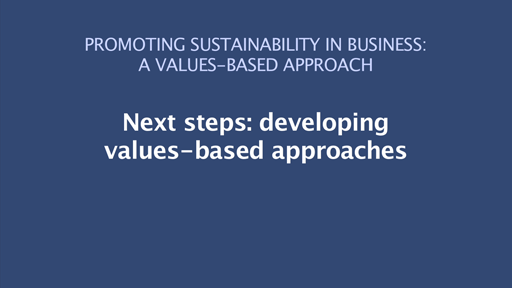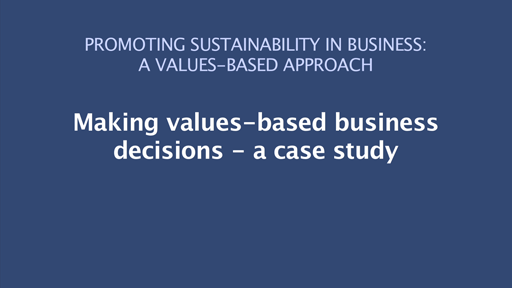Use 'Print preview' to check the number of pages and printer settings.
Print functionality varies between browsers.
Printable page generated Wednesday, 4 February 2026, 4:06 AM
5 Conclusion and action plan
5 Conclusion and action plan
In this final session of the course there is an opportunity to put what you have learned into practice by working through a short scenario based on a real-world situation (Activity 5.1). In the second activity you will hear some final reflections from the practitioners who took part in our workshops, review key learning points and consider next steps.
Activity 5.1: Practising with the values-based approach
Now read the second part of the scenario and make notes on Questions 2 and 3.
Six months later, while attending a business networking event, you bump into Lucy, the daughter of the current owner-managers of the same family manufacturing firm. She explains that she currently holds the position of Operations Manager, overseeing the efficient running of the factory, and that there is now a succession plan in place to transfer the ownership to her over the next five years so that her parents can retire.
Lucy reveals that she holds a strong concern for environmental issues, and wants the business to take proactive steps towards reducing its impact. However, she says that she feels limited in what she can do in her current role, and is aware of the difficulties of changing organisational culture, particularly when family relationships are involved.
In this scenario, Lucy is having to reconcile her personal values with the demands and remit of her job role, and the values and culture of the organisation. See Figure 1 (reminder – click on each source to see the values they represent).
Figure 1 (interactive) Values in the workplace
5.1 Reflecting on the values-based approach
In the next activity we revisit the practitioners for a final time to find out what they made of the workshops and which aspects of the values-based approach they intend to apply to their own practice.
Activity 5.2: Reflections
The aim of this activity is to encourage you to reflect on the course as a whole, and to consider how you might incorporate the values-based approach into your own professional practice.
Watch the video (around 2 and a half minutes).

Transcript
Next steps: developing values-based approaches
[MUSIC PLAYING]
[How might you apply these ideas to your own practice?]
Questions
- What values have you encountered in your career so far?
- Thinking about the culture of your current organisation and workplace, what values are most prominent?
- Has this course helped you to understand and to clarify what your own values are? If so, which of the 10 Basic Human Values do you most identify with?
Comment
In the video, these experienced advisors indicated that the workshops had helped them to identify the values that they had encountered in SMEs they’d worked with in the past.
Several mentioned how they were already adapting their approaches based on values in an instinctive way, but that the workshops had given them a framework for reflecting on this more formally.
 Final reflections (thinking point)
Final reflections (thinking point)
Values are always present in our everyday lives, at home and at work. However it is rare that we talk openly about our core values, and this can be especially true for busy SME owner-managers.
This course has been developed because we think that these values could provide the key to getting more SMEs to engage with environmental issues such as climate change. We think that by bringing values out into the open, by using appropriate language, empathy and sensitivity, intermediaries can help owner-managers to reconcile how their business operates with what is important to them.
Human beings often make assumptions about one another based on a variety of factors. When it comes to SMEs, we have observed that economic profit is too often assumed to be all that matters to business owners and managers. However, research tells us that entrepreneurs start businesses for a variety of reasons, and not simply for financial gain (e.g. Birley and Westhead, 1994; Dawson and Henley, 2015; Edelman et al., 2010).
Watch this video in which an advisor describes an unexpected interaction with an SME and consider what it says about the potential of developing a more values-based approach in your own work:

Transcript
Making values-based business decisions – a case study
[MUSIC PLAYING]
[What motivates businesses to go beyond ‘win–win’ – and what are the implications for practice?]
[‘Making a difference’]
[Implications for practice?]
[MUSIC PLAYING]
This video indicates that when SMEs take pro-environmental action, such as installing solar panels, they may be motivated by more than simply financial return on investment. Concern for climate change in the business community is on the rise, and there is an increasing awareness of the need for urgent action, even if that comes with a financial cost.
As our economy transitions away from a dependence on fossil fuels towards renewable energy, and as environmental issues become increasingly prominent in public discourse, it is inevitable that the cultures, norms and practices involved in doing business will change too. This includes the growth of self-styled ‘eco’ ventures and the transformation of existing businesses (Klewitz and Hansen, 2014; Schaper, 2016). Business advisors already play an important role in shaping how the economy is run, and it seems likely that their influence will be even more significant in a low carbon future.
Summary and action points
In this session we have worked through a scenario of an SME with conservative values, and explored how different language and messaging might be used by intermediaries to encourage change. We also learned how tensions can arise between personal and organisational values, and how intermediaries can help their clients to navigate these.
You had the chance to reflect on how and when you have encountered values in your own career, and which most strongly resonate with you. In the final activity, the advisor suggested that business cultures are changing, and that values – including those relating to the environment – may be becoming more influential for SMEs. In this context, a values-based approach offers the potential to link conventional forms of business engagement in areas such as energy saving to a wider range of social and environmental issues, from fulfilling responsibilities to our local community to being good stewards of our environment for the benefit of future generations.
You should now be able to:
- Identify which sets of values you have encountered in your professional career.
- Recognise the values that are particularly significant to you personally.
- Put into practice the values-based toolkit, and other ideas set out in this course.
You have now completed Session 5.
Thanks for taking this course – we hope that you have found it useful. If you wish to follow up on any of the issues covered in the five sessions, please refer to the Further reading and references section.
We hope you enjoyed the course and that you will continue the conversation in the LinkedIn discussion forum.